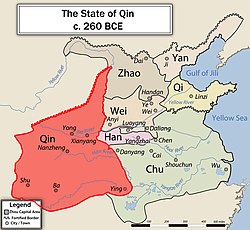Qin (state)
| Qin | ||||||||
|
秦 *Dzin |
||||||||
|
||||||||
| Capital | Qin (秦) Quanqiu (犬丘) Qian (汧) Pingyang (平陽) Yong (雍) Yueyang (櫟陽) Xianyang (咸陽) |
|||||||
| Religion | Chinese folk religion, Ancestor worship, Legalism | |||||||
| Government | Monarchy | |||||||
| Chancellor | Li Si | |||||||
| History | ||||||||
| • | Established | 9th century BC | ||||||
| • | Declared empire | 221 BC | ||||||
| Currency | ancient Chinese coinage | |||||||
|
||||||||
| Today part of | China | |||||||
| Qin | |||||||||||||||||||||||||||||

"Qin" in seal script (top) and regular (bottom) Chinese characters
|
|||||||||||||||||||||||||||||
| Chinese | 秦 | ||||||||||||||||||||||||||||
|---|---|---|---|---|---|---|---|---|---|---|---|---|---|---|---|---|---|---|---|---|---|---|---|---|---|---|---|---|---|
|
|||||||||||||||||||||||||||||
| Transcriptions | |
|---|---|
| Standard Mandarin | |
| Hanyu Pinyin | Qín |
| Wade–Giles | Ch'in2 |
| IPA | [tɕʰǐn] |
| Wu | |
| Suzhounese | Zín |
| Yue: Cantonese | |
| Yale Romanization | Chèuhn |
| Jyutping | Ceon4 |
| Southern Min | |
| Tâi-lô | Tsîn |
| Old Chinese | |
| Baxter-Sagart | *[dz]i[n] |
Qin (Chinese: 秦; Wade–Giles: Ch'in; Old Chinese: *[dz]i[n]) was an ancient Chinese state during the Zhou dynasty. It took its origin in a reconquest of western lands previously lost to the Rong; its position at the western edge of Chinese civilization permitted expansion and development that was unavailable to its rivals in the North China Plain. Following extensive "Legalist" reform in the 3rd century BC, Qin emerged as one of the dominant powers of the Seven Warring States and unified China in 221 BC under Shi Huangdi. The empire it established was short-lived but greatly influential on later Chinese history.
Though disliked by many Confucians of its time for "dangerously lacking in Confucian scholars," Confucian Xun Kuang wrote of the later Qin that "its topographical features are inherently advantageous," and that its "'manifold natural resources gave it remarkable inherent strength. Its people were unspoiled and exceedingly deferential; its officers unfailingly respectful, earnest, reverential, loyal, and trustworthy; and its high officials public-spirited, intelligent, and assiduous in the execution of the duties of their position. Its courts and bureaus functioned without delays and with such smoothness that it was as if there were no government at all."
According to the 2nd century BC historical text Records of the Grand Historian by Sima Qian, the Qin state traced its origin to one of the Five Emperors in ancient times, named Zhuanxu. One of his descendents, Boyi, was granted the family name of "Ying" () by King Shun. During the Xia and Shang dynasties, the Ying split in two: a western branch in Quanqiu (present-day Lixian in Gansu) and another branch that lived east of the Yellow River. The latter became the ancestors of the rulers of the Zhao state.
...
Wikipedia

